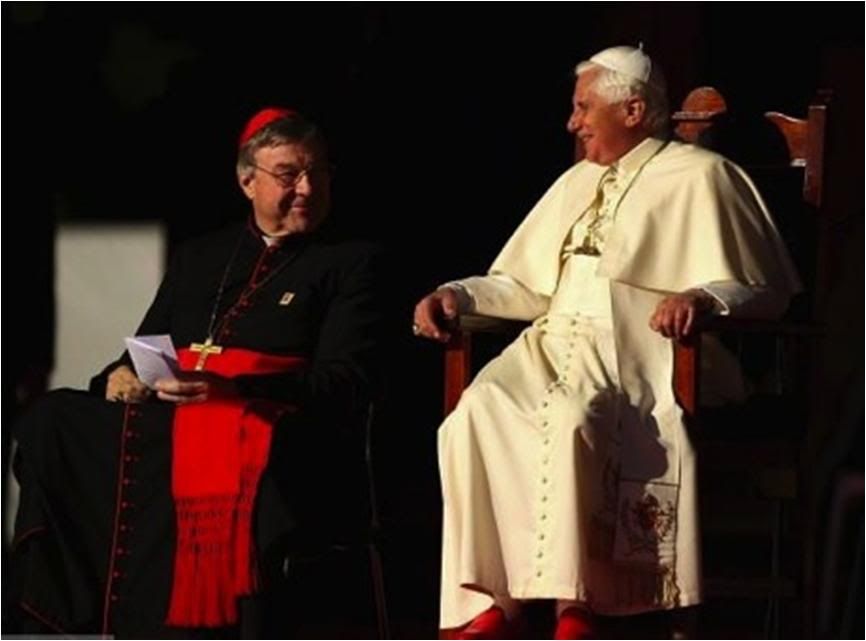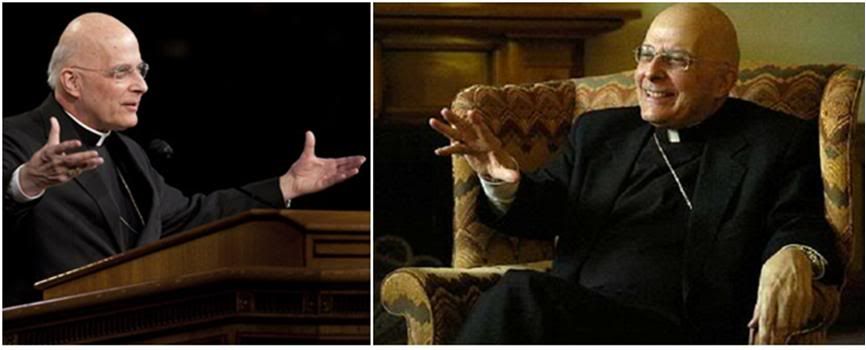Cardinal Pell, critic of the English hierarchy,
and no fan of the Tablet

May 5th, 2010
 Cardinal Pell and the Holy Father, at WYD Sydney, July 2008.
Cardinal Pell and the Holy Father, at WYD Sydney, July 2008.
“… I have long been disappointed by
The Tablet’s persistent subversions of some Catholic teaching and mystified by the inability of the English bishops to nudge it towards a more productive line of witness …”
Now, you may think it rather bad form of me to resurrect a letter written to the Bitter Pill by Cardinal George Pell back in 2002, but I’m sure Ma Pepinster and the gang have been re-reading it this week.
For, according to authoritative sources in Rome, the Cardinal Archbishop of Sydney (a Benedict loyalist), is to succeed Cardinal Giovanni Battista Re (not a Benedict loyalist) as Prefect of the Congregation for Bishops.
That will give him a significant degree of authority over the world’s 5,000 Catholic bishops. He will be able to “nudge” them – for example, to observe the conservative liturgical reforms for which he is partly responsible, such as the new English translation of the Missal.
And he will also have a huge say in who becomes a bishop in England Wales, a Church whose maladministration in recent decades has concerned him greatly. He knows this country well, and from an interesting perspective: while he was studying for his doctorate in church history at Oxford he served as chaplain to Eton. One of his best friends is Fr Alexander Sherbrooke, the OE parish priest of St Patrick’s, Soho, and one of the finest evangelists in London.
Cardinal Pell knows – knows for an absolute fact – that
many English bishops are (a) not up to the job intellectually, and (b) passively obstructive towards Summorum Pontificum and Anglicanorum Coetibus. Future bishops will not enjoy the luxury of ignoring papal directives.
Indeed, I suspect it won’t be long before certain current bishops have their collars felt. (Sorry to use such crude language, but he is an Aussie, and
the way the E&W hierarchy ignores Vatican directives is little short of criminal.)
He’s a fascinating man. I’ll return to the subject in a day or so, spelling out just why the Tabletistas will be so outraged by this news, but let me leave you with a taster of Pell’s plain-spoken approach. In 2007, he tightened up the rules allowing family members to speak at funerals, offering the following typically candid explanation (my emphasis):
“On not a few occasions, inappropriate remarks glossing over the deceased’s proclivities (
drinking prowess, romantic conquests etc) or about the Church (
attacking its moral teachings) have been made at funeral Masses.”
Cardinal among Mormons
by GEORGE WEIGEL

May 5, 2010
 Left, Cardinal Goerge at Brigham Young U last February; right, teh cardinal at home in Chicago.
Left, Cardinal Goerge at Brigham Young U last February; right, teh cardinal at home in Chicago.
The three years of service that Cardinal Francis George of Chicago has given the Church as president of the United States Conference of Catholic Bishops have been a great blessing.
A recent speech the cardinal gave at Brigham Young University in Provo, Utah, suggests that that service will continue long after Cardinal George hands the gavel to his successor as USCCB president in November.
Scholar-bishops have been rare in the history of the Church in the U.S; Cardinal George is an exception, a true intellectual with the gifted teacher’s capacity for making serious material accessible to people who’ve earned fewer degrees than he has. That gift was on full display at BYU this past Feb. 23.
After noting that Mormons and Catholics had lived “mostly apart from one another” for 180 years, and telling a nifty story about his 2007 experience guest-conducting the Mormon Tabernacle Choir (while getting in a plug for his beloved Chicago Cubs), Cardinal George got down to the business at hand, which was to explore why distance and suspicion have been replaced by mutual recognition and co-belligerency, as Catholic and Mormons have discovered in each other common moral principles and a shared commitment to reforming our culture. The first point of tangency in this new relationship has to do with religious freedom.
As I’ve noted before, there is an attempt in some quarters today to hollow out religious freedom by reducing it to a variant on lifestyle choice—an essentially private matter. Cardinal George is not buying that and he told his Mormon audience why:
“Religious freedom cannot be reduced to freedom of worship or even freedom of private conscience. Religious freedom means that religious groups as well as religious individuals have a right to exercise their influence in the public square…
"Any attempt to reduce that fuller sense of religious freedom, which has been part of our history in this country for more than two centuries, to a private reality of worship and individual conscience as long as you don’t make anybody else unhappy, is not in our tradition.
"It was the tradition of the Soviet Union, where Lenin permitted freedom of worship (it was in the constitution of the Soviet Union) but not freedom of religion.”
The cardinal then moved on to the defense of the family:
“…[It’s] not individuals and their rights that are the basis of society, although they might be the basis of a political order, but it is the family that is the basic unit of society: mothers and fathers who have duties and obligations to their children, and children who learn how to be human in the school of love which is the family, which tells us that we’re not the center of the world individually but are rather always someone’s son, someone’s daughter, someone’s brother or sister or cousin or uncle. The family relationships are prior to individual self-consciousness. That is the basis of Catholic social teaching…”
"Marriage, which is the basis of the family, is not something the state can redefine: marriage is an institution of civil society that a just state must acknowledge and protect.
"States that insist on redefining marriage will therefore get pushback from religious institutions that understand that the state is attempting to encroach on territory that is in principle beyond its reach.
"The state will not like this. It will attempt to compel compliance with its redefinitions, and “if this first wave is successfully resisted, there will be a second series of government punishments for our persistence. We will lose state or local government contracts, tax exemptions, anything else that could be characterized as a ‘subsidy’ for our ‘discrimination.’”
And that is why, Cardinal George concluded, “inter-religious coalitions formed to defend the rights of conscience for individuals or for religious institutions should become a vital bulwark against the tide of forces at work in our government and society to reduce religion to a purely private reality. At stake is whether or not the religious voice will maintain its right to be heard in the public square.”
Let the Mormon Tabernacle Choir sing “Amen!”
[Modificato da TERESA BENEDETTA 06/05/2010 05:06]